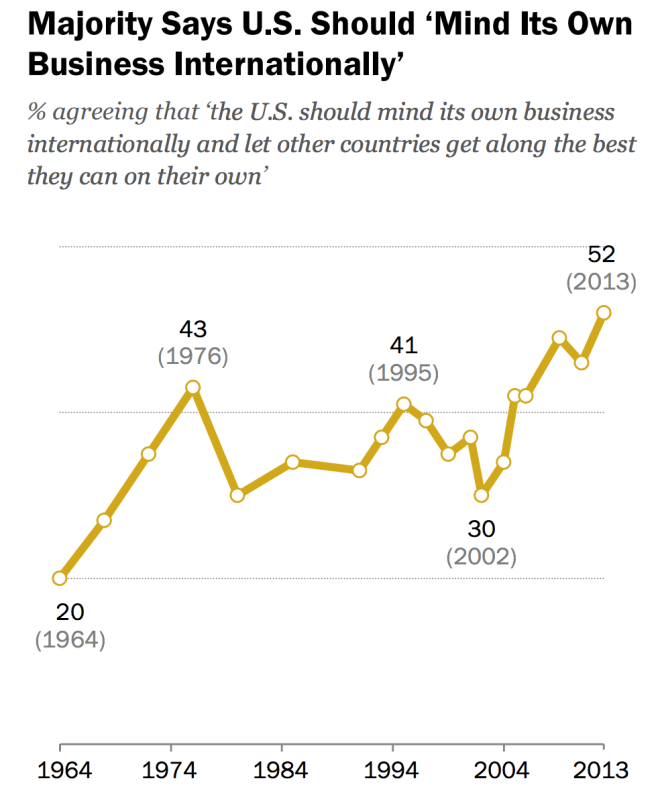Drezner flags a new Pew survey (pdf) on foreign policy. He notes that historically, “there’s a foreign policy disconnect between Washington elites and the rest of the country — the former is far more enthusiastic about liberal internationalism than the latter.” But that is less true today:
What’s driving this convergence of views? I’d suggest that the hangover of Iraq, the curdling of the Arab Spring, the Great Recession, and the evaporation of the neoconservative wing of the GOP foreign policy apparatus all have something to do with it (see here for more). Furthermore, in policy terms the convergence has been even more concentrated: President’s Obama’s policies towards Syria and Iran mirror public attitudes much more closely than elite attitudes.
Mataconis notes that Americans are becoming warier of US intervention around the world:
The public, it seems, is tired of war and tired of the United States must involve itself in every potential conflict around the globe. At the same time, though, it would be unfair to label the public’s attitude as “isolationist” when, at the same time, they are strongly in favor of the nation’s role in the global economy and in favor of seeing that type of international engagement expanded in the future. …
Perhaps the most interesting takeaway from the poll, though, is found in the fact that increasing numbers of the American public sees the U.S. as playing a lesser role in the role in the world today than it has in the past, and that it has lost respect in the world over the years, and they seem entirely okay with that. Does this mean that the jingoistic vision that once motivated American foreign policy in both parties, and which seems to still be a strong part of foreign policy in the Republican Party is fading away? Or, is it a reflection of a general pessimism about the direction the nation has been moving in the past decade or so?
Robert Golan-Vilella adds his analysis:
The main headline that some observers have grabbed on to in the Pew poll is that the number of people who say both that the United States “does too much” in helping to solve world problems and that it plays “a less important role” as a world leader are at record highs. But it’s not quite that simple. The “less important role” that the U.S. public envisions its government playing abroad still involves doing quite a lot of things. 56 percent think “U.S. policies [should] try to keep it so America is the only military superpower,” and on average Americans want to preserve current levels of defense spending. Large majorities said that “taking measures to protect the U.S. from terrorist attacks” (83 percent) and “preventing the spread of weapons of mass destruction” (73 percent) should be “top priorities” among U.S. long-range goals.
This is a public, in short, that cares deeply about maintaining an overwhelmingly powerful military and taking decisive action against what it sees as core threats to American security—both central tenets of Jacksonian thinking. What the public doesn’t see as top priorities are things like “helping improve living standards in developing nations” (23 percent), “promoting democracy in other countries” (18 percent), and “promoting and defending human rights in other countries” (33 percent).
